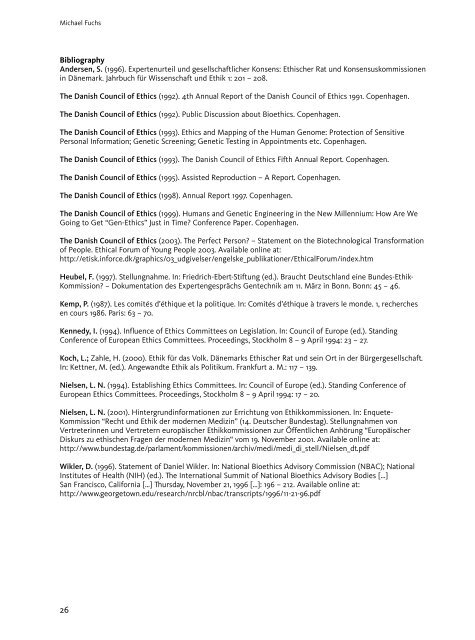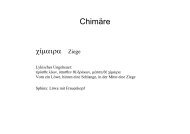Michael Fuchs National ethics councils - Deutscher Ethikrat
Michael Fuchs National ethics councils - Deutscher Ethikrat
Michael Fuchs National ethics councils - Deutscher Ethikrat
Create successful ePaper yourself
Turn your PDF publications into a flip-book with our unique Google optimized e-Paper software.
<strong>Michael</strong> <strong>Fuchs</strong> <strong>National</strong> <strong>ethics</strong> <strong>councils</strong>. Their backgrounds, functions and modes of operation compared<br />
Bibliography<br />
Andersen, S. (1996). Expertenurteil und gesellschaftlicher Konsens: Ethischer Rat und Konsensuskommissionen<br />
in Dänemark. Jahrbuch für Wissenschaft und Ethik 1: 201 – 208.<br />
The Danish Council of Ethics (1992). 4th Annual Report of the Danish Council of Ethics 1991. Copenhagen.<br />
The Danish Council of Ethics (1992). Public Discussion about Bio<strong>ethics</strong>. Copenhagen.<br />
The Danish Council of Ethics (1993). Ethics and Mapping of the Human Genome: Protection of Sensitive<br />
Personal Information; Genetic Screening; Genetic Testing in Appointments etc. Copenhagen.<br />
The Danish Council of Ethics (1993). The Danish Council of Ethics Fifth Annual Report. Copenhagen.<br />
The Danish Council of Ethics (1995). Assisted Reproduction – A Report. Copenhagen.<br />
The Danish Council of Ethics (1998). Annual Report 1997. Copenhagen.<br />
The Danish Council of Ethics (1999). Humans and Genetic Engineering in the New Millennium: How Are We<br />
Going to Get “Gen-Ethics” Just in Time? Conference Paper. Copenhagen.<br />
The Danish Council of Ethics (2003). The Perfect Person? – Statement on the Biotechnological Transformation<br />
of People. Ethical Forum of Young People 2003. Available online at:<br />
http://etisk.inforce.dk/graphics/03_udgivelser/engelske_publikationer/EthicalForum/index.htm<br />
Heubel, F. (1997). Stellungnahme. In: Friedrich-Ebert-Stiftung (ed.). Braucht Deutschland eine Bundes-Ethik-<br />
Kommission? – Dokumentation des Expertengesprächs Gentechnik am 11. März in Bonn. Bonn: 45 – 46.<br />
Kemp, P. (1987). Les comités d’éthique et la politique. In: Comités d’éthique à travers le monde. 1, recherches<br />
en cours 1986. Paris: 63 – 70.<br />
Kennedy, I. (1994). Influence of Ethics Committees on Legislation. In: Council of Europe (ed.). Standing<br />
Conference of European Ethics Committees. Proceedings, Stockholm 8 – 9 April 1994: 23 – 27.<br />
Koch, L.; Zahle, H. (2000). Ethik für das Volk. Dänemarks Ethischer Rat und sein Ort in der Bürgergesellschaft.<br />
In: Kettner, M. (ed.). Angewandte Ethik als Politikum. Frankfurt a. M.: 117 – 139.<br />
Nielsen, L. N. (1994). Establishing Ethics Committees. In: Council of Europe (ed.). Standing Conference of<br />
European Ethics Committees. Proceedings, Stockholm 8 – 9 April 1994: 17 – 20.<br />
Nielsen, L. N. (2001). Hintergrundinformationen zur Errichtung von Ethikkommissionen. In: Enquete-<br />
Kommission “Recht und Ethik der modernen Medizin” (14. <strong>Deutscher</strong> Bundestag). Stellungnahmen von<br />
Vertreterinnen und Vertretern europäischer Ethikkommissionen zur Öffentlichen Anhörung “Europäischer<br />
Diskurs zu ethischen Fragen der modernen Medizin“ vom 19. November 2001. Available online at:<br />
http://www.bundestag.de/parlament/kommissionen/archiv/medi/medi_di_stell/Nielsen_dt.pdf<br />
Wikler, D. (1996). Statement of Daniel Wikler. In: <strong>National</strong> Bio<strong>ethics</strong> Advisory Commission (NBAC); <strong>National</strong><br />
Institutes of Health (NIH) (ed.). The International Summit of <strong>National</strong> Bio<strong>ethics</strong> Advisory Bodies […]<br />
San Francisco, California […] Thursday, November 21, 1996 […]: 196 – 212. Available online at:<br />
http://www.georgetown.edu/research/nrcbl/nbac/transcripts/1996/11-21-96.pdf<br />
26<br />
Norway<br />
Norway considers its model of the national organization of research <strong>ethics</strong> to be<br />
unique in so far as it not only extends to biomedicine and biotechnology but also<br />
seeks to cover all fields of research. In 1988/89, the Government proposed the establishment<br />
of three national committees for research <strong>ethics</strong>. Following parliamentary<br />
approval in 1990, the Ministry of Education, Research and Church Affairs defined<br />
their mandates in detail. The members are nominated by the Research Council of<br />
Norway and appointed by the Minister. They are not representatives of interest<br />
groups, but are selected on the basis of personal qualification. Each committee is to<br />
comprise at least nine members, of whom two in each case must be not specialists but<br />
lay persons. The other members are specialists in <strong>ethics</strong> and law and specialists in the<br />
disciplines for which the relevant committee is competent. In the case of the <strong>National</strong><br />
Committee for Medical Research Ethics (Den Nasjonale Forskningsetiske Komité<br />
for Medisin, NEM), at least clinical practice and genetics must be represented. Important<br />
issues considered have been the communication of fundamental and clinical<br />
research, problems of resource allocation, and also the interests of sport. In<br />
September 2001, the Committee published guidelines on the inclusion of women in<br />
clinical studies. During the current term (2003 – 2005), guidelines for clinical research<br />
on persons with limited mental competence are in preparation.<br />
In the case of the <strong>National</strong> Committee for Research Ethics in Science and Technology<br />
(Den Nasjonale Forskningsetiske Komité for Naturvitenskap og Teknologi,<br />
NENT), the natural sciences, industry, technology, agricultural and fisheries research<br />
must be represented, and there is explicit provision for representation of the disciplines<br />
of ecology and modern biotechnology. The Committee has worked on problems<br />
of gene technology in agriculture and on fisheries issues, and has taken part in<br />
research projects for the European Commission.<br />
Finally, with the NESH (Den Nasjonale Forskningsetiske Komité for Samfunnsvitenskap<br />
og Humaniora), Norway also possesses an equivalent committee for<br />
research <strong>ethics</strong> in the social sciences and the humanities. The specialists represented<br />
on this committee are required to possess expertise in the fields of history, government,<br />
sociology, psychology and ethnology. Its competence extends from the ethical<br />
aspects of social-science research on children and of migration research to ethical issues<br />
in literary studies.<br />
In each of the fields covered by the three committees, research <strong>ethics</strong> is supposed not<br />
to be defined narrowly but to be understood in the wider sense of a scientific <strong>ethics</strong> that<br />
takes account of the responsibility of the sciences for social issues. Coordination and<br />
the ability to take advantage of synergies are intended to be facilitated by institutional<br />
and physical proximity. The committees share a single press and information office.<br />
Website<br />
De Nasjonale Forskningsetiske Komiteer: http://www.etikkom.no<br />
27




